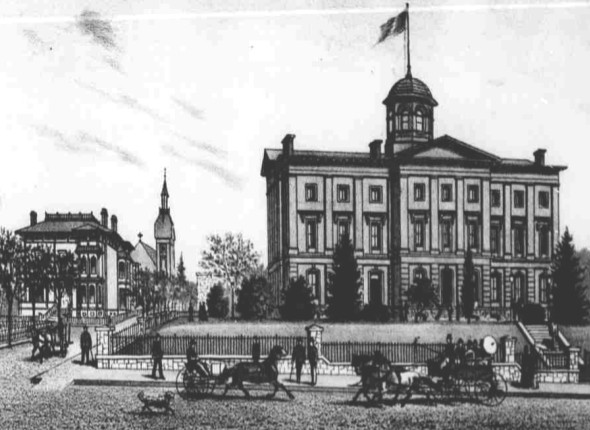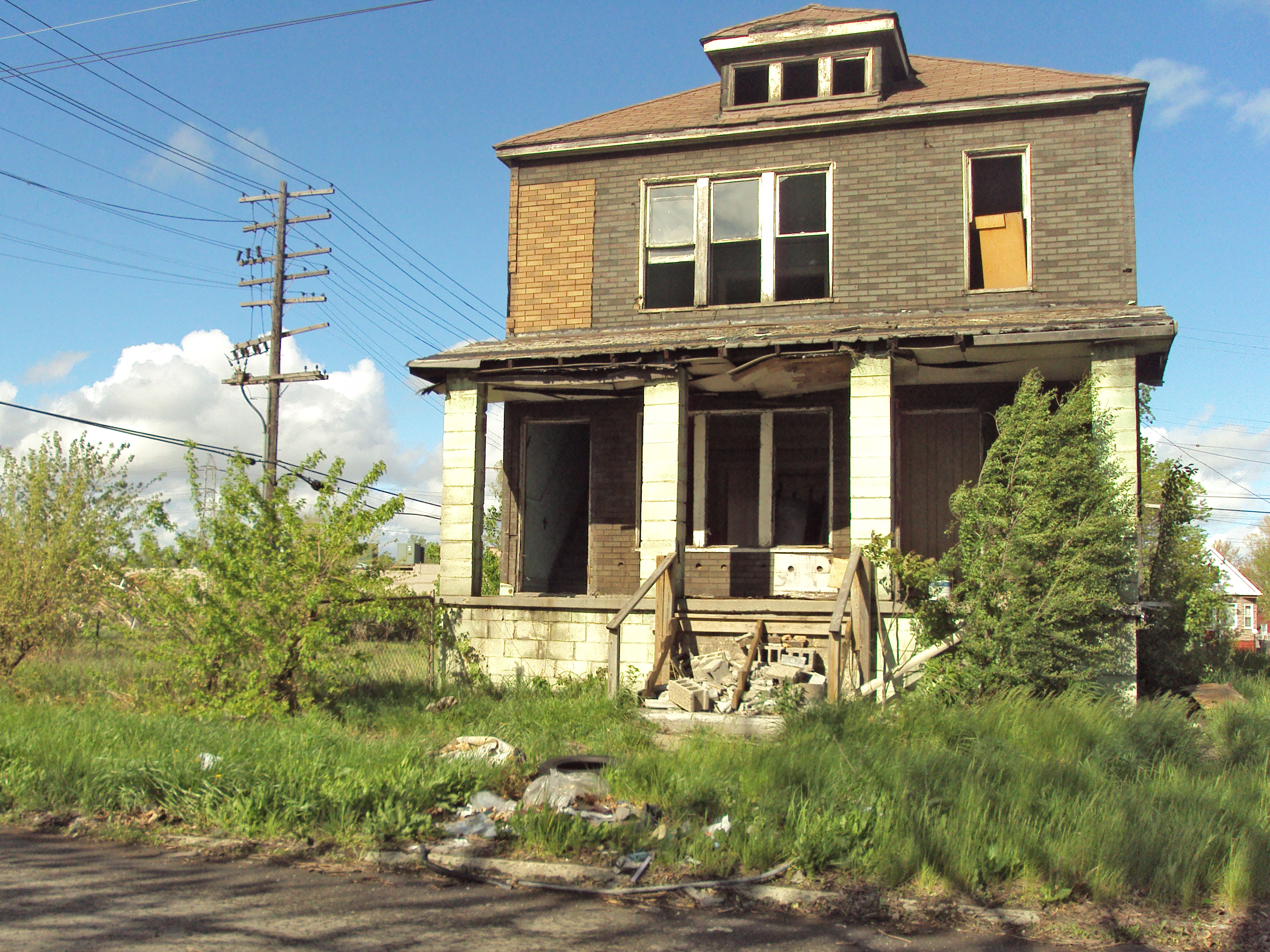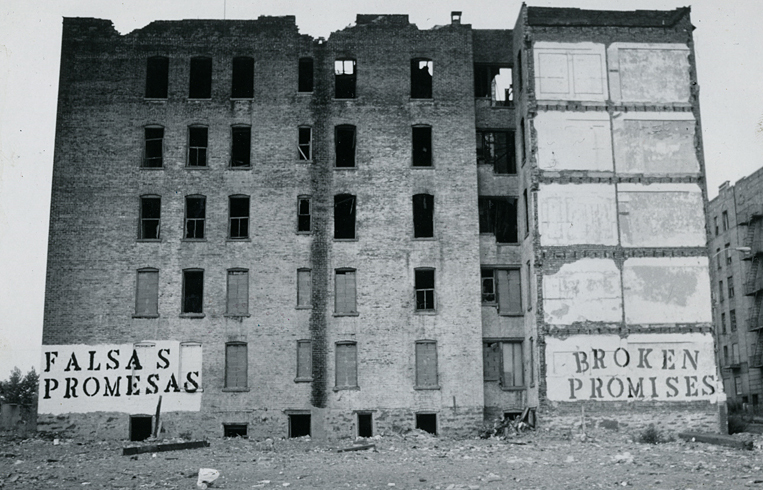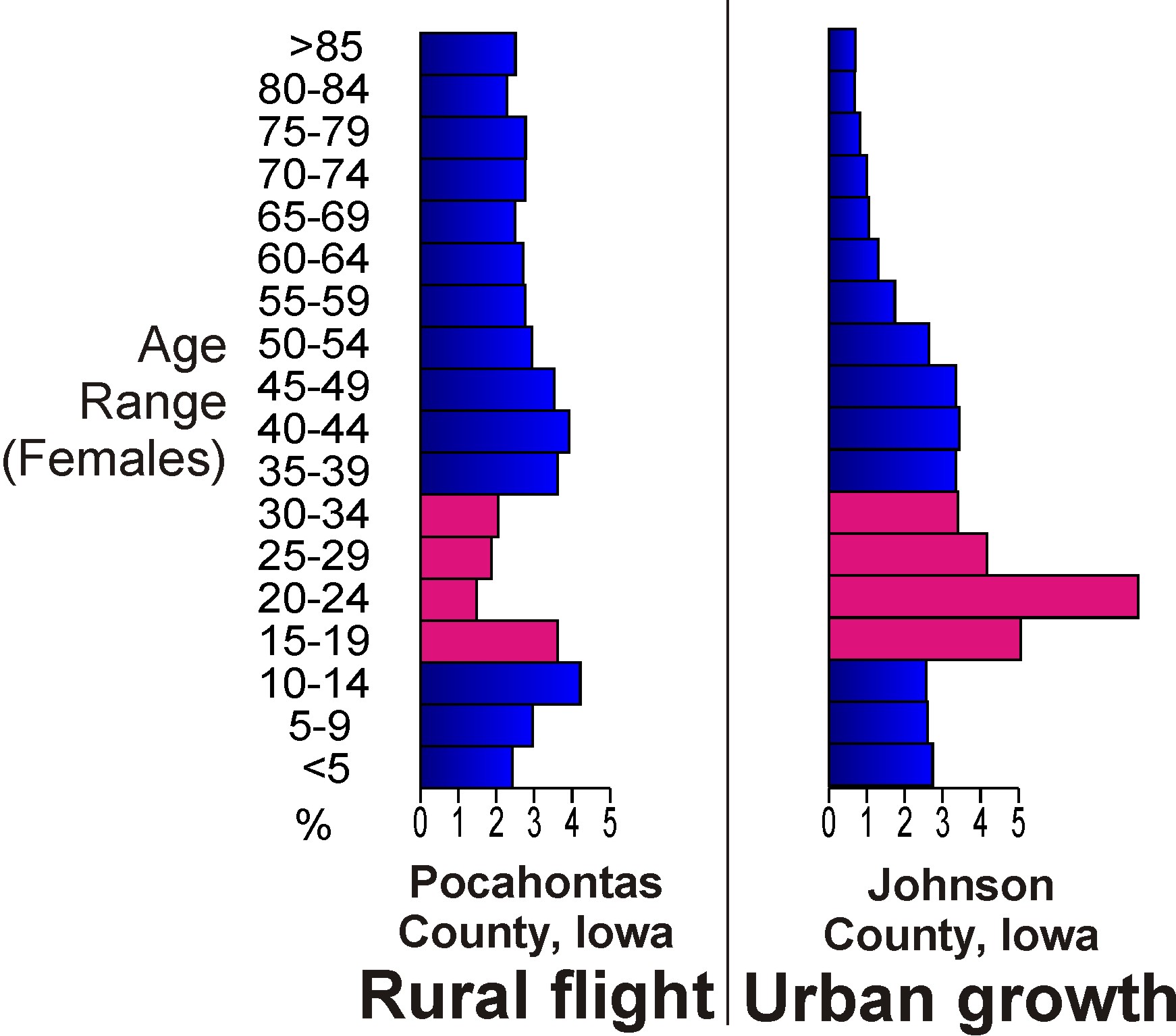|
Counter Urbanization
Counterurbanization, or deurbanization, is a demographic and social process whereby people move from urban areas to rural areas. It is, like suburbanization, inversely related to urbanization. It first occurred as a reaction to inner-city deprivation. More recent research has documented the social and political drivers of counterurbanization and its impacts in developing countries such as China, which are currently undergoing the process of mass urbanization. It is one of the causes that can lead to shrinking cities. While counterurbanization manifests differently across the world, all forms revolve around the central idea of migration movement from a populated location to a less populated location. Clare J.A. Mitchell, an associate professor in the Department of Geography at the University of Waterloo, argues that in Europe, counterurbanization involves a type of migration leading to deconcentration of one area to another that is beyond suburbanization or metro decentralization. ... [...More Info...] [...Related Items...] OR: [Wikipedia] [Google] [Baidu] |
Demographic
Demography () is the statistical study of populations, especially human beings. Demographic analysis examines and measures the dimensions and dynamics of populations; it can cover whole societies or groups defined by criteria such as education, nationality, religion, and ethnicity. Educational institutions usually treat demography as a field of sociology, though there are a number of independent demography departments. These methods have primarily been developed to study human populations, but are extended to a variety of areas where researchers want to know how populations of social actors can change across time through processes of birth, death, and migration. In the context of human biological populations, demographic analysis uses administrative records to develop an independent estimate of the population. Demographic analysis estimates are often considered a reliable standard for judging the accuracy of the census information gathered at any time. In the labor ... [...More Info...] [...Related Items...] OR: [Wikipedia] [Google] [Baidu] |
Portland, Oregon
Portland (, ) is a port city in the Pacific Northwest and the largest city in the U.S. state of Oregon. Situated at the confluence of the Willamette and Columbia rivers, Portland is the county seat of Multnomah County, the most populous county in Oregon. Portland had a population of 652,503, making it the 26th-most populated city in the United States, the sixth-most populous on the West Coast, and the second-most populous in the Pacific Northwest, after Seattle. Approximately 2.5 million people live in the Portland metropolitan statistical area (MSA), making it the 25th most populous in the United States. About half of Oregon's population resides within the Portland metropolitan area. Named after Portland, Maine, the Oregon settlement began to be populated in the 1840s, near the end of the Oregon Trail. Its water access provided convenient transportation of goods, and the timber industry was a major force in the city's early economy. At the turn of the 20th century, the ... [...More Info...] [...Related Items...] OR: [Wikipedia] [Google] [Baidu] |
Urban Planning
Urban planning, also known as town planning, city planning, regional planning, or rural planning, is a technical and political process that is focused on the development and design of land use and the built environment, including air, water, and the infrastructure passing into and out of urban areas, such as transportation, communications, and distribution networks and their accessibility. Traditionally, urban planning followed a top-down approach in master planning the physical layout of human settlements. The primary concern was the public welfare, which included considerations of efficiency, sanitation, protection and use of the environment, as well as effects of the master plans on the social and economic activities. Over time, urban planning has adopted a focus on the social and environmental bottom-lines that focus on planning as a tool to improve the health and well-being of people while maintaining sustainability standards. Sustainable development was added as one of th ... [...More Info...] [...Related Items...] OR: [Wikipedia] [Google] [Baidu] |
Urban Decay
Urban decay (also known as urban rot, urban death or urban blight) is the sociological process by which a previously functioning city, or part of a city, falls into disrepair and decrepitude. There is no single process that leads to urban decay which is why it can be hard to encapsulate its magnitude. Urban decay can include the following aspects: * Deindustrialization * Depopulation * Counterurbanization * Economic Restructuring * Abandoned buildings or infrastructure * High local unemployment * Increased poverty * Fragmented families * Low overall living standards or quality of life * Political disenfranchisement * Crime * Elevated levels of pollution * Desolate cityscape known as greyfield land or urban prairie Since the 1970s and 1980s, urban decay has been a phenomenon associated with some Western cities, especially in North America and parts of Europe. Cities have experienced population flights to the suburbs and exurb commuter towns; often in the form of white ... [...More Info...] [...Related Items...] OR: [Wikipedia] [Google] [Baidu] |
Shrinking City
Shrinking cities or urban depopulation are dense cities that have experienced a notable population loss. Emigration (migration from a place) is a common reason for city shrinkage. Since the infrastructure of such cities was built to support a larger population, its maintenance can become a serious concern. A related phenomenon is counterurbanization. Definition Origins The phenomenon of shrinking cities generally refers to a metropolitan area that experiences significant population loss in a short period of time. The process is also known as counterurbanization, metropolitan deconcentration, and metropolitan turnaround. It was popularized in reference to Eastern Europe post-socialism, when old industrial regions came under Western privatization and capitalism. Shrinking cities in the United States, on the other hand, have been forming since 2006 in dense urban centers while external suburban areas continue to grow. Suburbanization in tandem with deindustrialization, human mig ... [...More Info...] [...Related Items...] OR: [Wikipedia] [Google] [Baidu] |
White Flight
White flight or white exodus is the sudden or gradual large-scale migration of white people from areas becoming more racially or ethnoculturally diverse. Starting in the 1950s and 1960s, the terms became popular in the United States. They referred to the large-scale migration of people of various European ancestries from racially mixed urban regions to more racially homogeneous suburban or exurban regions. The term has more recently been applied to other migrations by whites, from older, inner suburbs to rural areas, as well as from the U.S. Northeast and Midwest to the milder climate in the Southeast and Southwest. The term 'white flight' has also been used for large-scale post-colonial emigration of whites from Africa, or parts of that continent, driven by levels of violent crime and anti-colonial or anti-white state policies. Migration of middle-class white populations was observed during the civil rights movement in the 1950s and 1960s out of cities such as Cleveland, D ... [...More Info...] [...Related Items...] OR: [Wikipedia] [Google] [Baidu] |
Urbicide
Urbicide is a term which literally translates (Latin: ''urbs'': city + Latin: ''occido'': to kill) as "violence against the city". The term was first coined by the author Michael Moorcock in 1963 and later used since the 1960s by urban planners and architects. Ada Louise Huxtable in 1968 and Marshall Berman in 1996 have written about urban restructuring (and destruction) in areas like the Bronx, and highlight the impacts of aggressive redevelopment on the urban social experience. The term has come into being in an age of rapid globalization and urbanization. This rapid globalization trend has led to the focus of violence and destruction in the context of the city rather than its surroundings. Especially after the siege of Sarajevo, recognition has begun to be given to the cases of violence specifically directed to the destruction of an urban area. The exact constraints and definition of this term continue to be debated because the limits of this emerging concept make it extremel ... [...More Info...] [...Related Items...] OR: [Wikipedia] [Google] [Baidu] |
Rural Flight
Rural flight (or rural exodus) is the migratory pattern of peoples from rural areas into urban areas. It is urbanization seen from the rural perspective. In industrializing economies like Britain in the eighteenth century or East Asia in the twentieth century, it can occur following the industrialization of primary industries such as agriculture, mining, fishing, and forestry—when fewer people are needed to bring the same amount of output to market—and related secondary industries (refining and processing) are consolidated. Rural exodus can also follow an ecological or human-caused catastrophe such as a famine or resource depletion. These are examples of push factors. The same phenomenon can also be brought about simply because of higher wages and educational access available in urban areas; examples of pull factors. Once rural populations fall below a critical mass, the population is too small to support certain businesses, which then also leave or close, in a v ... [...More Info...] [...Related Items...] OR: [Wikipedia] [Google] [Baidu] |
Exurb
An exurb (or alternately: exurban area) is an area outside the typically denser inner suburban area, at the edge of a metropolitan area, which has some economic and commuting connection to the metro area, low housing density, and growth. It shapes an interface between urban and rural landscapes holding a limited urban nature for its functional, economic, and social interaction with the urban center, due to its dominant residential character. They consist of "agglomerations of housing and jobs outside the municipal boundaries of a primary city" and beyond the surrounding suburbs. Definitions The word ''exurb'' (a portmanteau of ''extra (outside)'' and ''urban'') was coined by Auguste Comte Spectorsky, in his 1955 book ''The Exurbanites'', to describe the ring of prosperous communities beyond the suburbs, that are commuter towns for an urban area. In other uses the term has expanded to include popular extraurban districts which nonetheless may have poor transportation and under ... [...More Info...] [...Related Items...] OR: [Wikipedia] [Google] [Baidu] |
Far-left Politics
Far-left politics, also known as the radical left or the extreme left, are politics further to the left on the left–right political spectrum than the standard political left. The term does not have a single definition. Some scholars consider it to represent the left of social democracy, while others limit it to the left of communist parties. In certain instances, especially in the news media, ''far-left'' has been associated with some forms of authoritarianism, anarchism, and communism, or it characterizes groups that advocate for revolutionary socialism, Marxism and related communist ideologies, anti-capitalism or anti-globalization. Extremist far-left politics have motivated political violence, radicalization, genocide, terrorism, sabotage and damage to property, the formation of militant organizations, political repression, conspiracism, xenophobia, and nationalism. Far-left terrorism consists of militant or insurgent groups that attempt to realize their ideals thro ... [...More Info...] [...Related Items...] OR: [Wikipedia] [Google] [Baidu] |
Down To The Countryside Movement
The Up to the Mountains and Down to the Countryside Movement, often known simply as the Down to the Countryside Movement, was a policy instituted in the People's Republic of China between mid 1950s and 1978. As a result of what he perceived to be pro-bourgeois thinking prevalent during the Cultural Revolution, Chairman Mao Zedong declared certain privileged urban youth would be sent to mountainous areas or farming villages to learn from the workers and farmers there. In total, approximately 17 million youth were sent to rural areas as a result of the movement. Usually only the oldest child had to go, but younger siblings could volunteer to go instead. Chairman Mao's policy differed from Chinese President Liu Shaoqi's early 1960s sending-down policy in its political context. President Liu Shaoqi instituted the first sending-down policy to redistribute excess urban population following the Great Chinese Famine and the Great Leap Forward. Mao's stated aim for the policy was ... [...More Info...] [...Related Items...] OR: [Wikipedia] [Google] [Baidu] |
Cultural Revolution
The Cultural Revolution, formally known as the Great Proletarian Cultural Revolution, was a sociopolitical movement in the People's Republic of China (PRC) launched by Mao Zedong in 1966, and lasting until his death in 1976. Its stated goal was to preserve Chinese communism by purging remnants of capitalist and traditional elements from Chinese society. The Revolution marked the effective commanding return of Mao –who was still the Chairman of the Chinese Communist Party (CCP)– to the centre of power, after a period of self-abstention and ceding to less radical leadership in the aftermath of the Mao-led Great Leap Forward debacle and the Great Chinese Famine (1959–1961). The Revolution failed to achieve its main goals. Launching the movement in May 1966 with the help of the Cultural Revolution Group, Mao charged that bourgeois elements had infiltrated the government and society with the aim of restoring capitalism. Mao called on young people to "bombard the headqu ... [...More Info...] [...Related Items...] OR: [Wikipedia] [Google] [Baidu] |







.jpg)